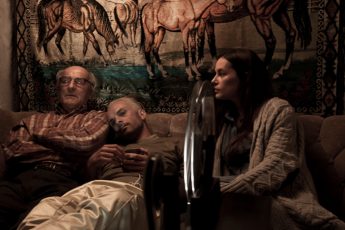Mourning Day
Teona S. Mitevska’s The Woman Who Brushed Off Her Tears (Man on Aspahlt, 2012)
Vol. 14 (February 2012) by Colette de Castro
The Woman Who Brushed Off Her Tears is a film about two strong women, one living in France and the other in Macedonia. Helena (Victoria Abril) is a Parisian and Asjun (Labina Mitsevska), who is younger, lives in the Macedonian mountains. They are separated not only by distance, but also by epoch: Asjun Juruci’s tribe seems to come from the last century, with their colorfully woven clothes and their preindustrial farming techniques.
Helena loses her son to suicide in the first shocking scene of the film. After trying to rape her, he hints darkly that he has been sexually abused by his father for years, then kills himself by jumping off a balcony several stories high. On the other side of the story, soon we meet Asjun who has a younger son. At 10, he stays home to help around the house. She is living with her strict father in a hut in the mountains. Her husband has gone to France to find the money which will allow the two to be married, but he has been gone too long and Asjun’s father says he will kill him if he ever returns. Asjun goes to a clinic after being beaten by her father. The local Macedonian police tells her that her son will be taken away from her if she doesn’t send him to school, something she can’t do. Asjun is torn between these two authorities.
Both of these women are grieving, Helena for the loss of her son, Asjun because she thinks she has lost her husband and she fears losing her son. The grief however, is largely suppressed. Helena carries on with her work as a parole officer, stone-faced she endures cleaning up the smashed pot-plants on the balcony. Asjun continues working and looking after her son, the only sign of her grief being in her eyes. There are occasional moments where they almost break down — but this is no Hollywood film. We don’t see sobbing and brow-beating. At one point, Helena, chatting on her cellphone as she walks home from work, finds the body of a man who has just killed himself by jumping off a balcony. This strange coincidence leads her to break down in group therapy the next day, openly blaming her husband for what happened though she does not reveal the reason. Although it was a positive change to see Helena expressing her grief, the trigger of a second suicide by jumping felt far-fetched and an unnecessarily literal reminder to the audience of her son’s death.
Shakespeare’s Hamlet talks about the expression of grief in one of his famous monologues. Having just watched a play, he questions how the actor managed to express grief for an imaginary death, when Hamlet himself cannot shed a tear for his murdered father. “Is it not monstrous,” he asks, “that this player here, but in a fiction, in a dream of passion, could force his soul so to his own conceit?” This ‘mise en abyme’ highlights the way grief can be expressed in different ways, by suppressing it and by expressing it. An actor can express grief in way that is more understandable to an outsider than to the griever. The title of the film is telling – like Hamlet who is looking for revenge over his father’s death, the women both need to brush off their tears to effectively continue in their struggle for revenge. Helena wants to take revenge on her husband and Asjun on her father. Some may interpret Victoria Abril’s acting as inexpressive, but in fact it is essential to her role as Helena. She can’t afford to jeopardize her plans by showing her grief openly at this stage.
Teona Strugar Mitsevska wrote and directed this beautiful but disturbing look at the lives of two women whose paths eventually cross, though only briefly. For Helena, we learn that her principal motivation throughout the film has been revenge, and her grief comes to a bloody and victorious end. Asjun’s role is much more passive, but her perseverance pays off in the end. Set in the snowy Macedonian mountains to the music of Arvo Pärt’s Tabula Rasa, this film explores how real grief manifests itself when it is suppressed, and then explodes.




Leave a Comment